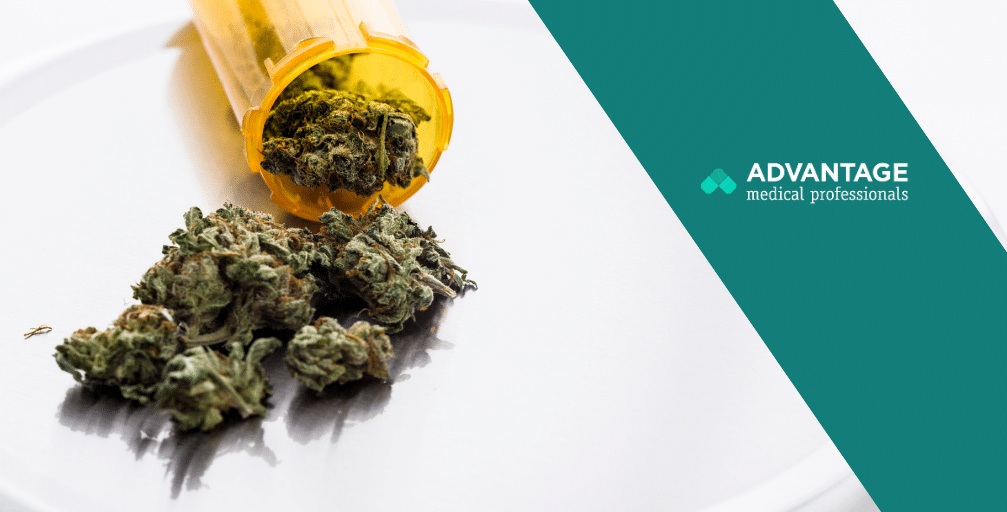Marijuana for Therapeutic Use

Marijuana for Therapeutic Use
Clinician’s Corner
Angela Totora, MBA/HA, RN
Director of Nursing
Marijuana for Therapeutic Use
There is a lot of talk about medical marijuana. Do you know what that means to you as a nurse? Here are a few topics that might help you understand this complex issue.
Obtaining and using medical marijuana is a complex and somewhat uncertain environment that is created due to the conflict between state and federal laws. Marijuana is considered a Schedule I substance. More clearly stated, it is regarded as a federally illegal drug. Therefore, pharmacies cannot shelve it, doctors cannot prescribe it, and insurance plans cannot cover the expense of it.
Who Can Recommend Medical Marijuana?
Each state holds unique characteristics for developing medical marijuana programs. These programs include provisions regarding the process of procuring a certification for the use of cannabis. The medical marijuana programs identify the requirement of a healthcare provider-patient relationship needed to recommend the medical use of marijuana. Remember, each state defines its legislation with very few commonalities to the other states.
In Louisiana, only a marijuana certified doctor can complete a recommendation. At present, a Louisiana doctor can only serve 100 medical marijuana patients at any given time. This physician must coordinate all of the patient’s medical care.
Who can Obtain Medical Marijuana?
Louisiana does not require patients to join a registry or get a medical marijuana card, as some other states do. They must obtain a recommendation from a marijuana-certified doctor in Louisiana. This written recommendation serves as proof of the patient’s eligibility based upon the diagnosis of a qualifying condition. These conditions include but are not limited to:
Cancer, Crohn’s Disease, Chronic Pain, Destructive or physically aggressive behaviors, Epilepsy, Glaucoma, Hepatitis C, HIV, Muscular Dystrophy, Parkinson’s Disease, Post-Traumatic Stress Disorder, Seizure Disorders, Spasticity and Wasting Syndrome.
What Qualifies as Medical Marijuana?
Tetrahydrocannabinols (THC) or a chemical derivative of tetrahydrocannabinols in any of the following forms, as provided by an approved Louisiana licensed medical marijuana dispensary:
- Oils, extracts, tinctures, or sprays
- Solid oral dosage forms, e.g., capsules or pills
- Liquid oral dosage forms, e.g., solutions or suspensions
- Gelatin-based chewable
- Topical applications, oils, or lotions
- Transdermal patches
- Suppositories
- Inhalation, raw or crude marijuana are not legal forms of medical marijuana in Louisiana.
Where can Qualified Patients get Medical Marijuana?
The Department of Agriculture and Forestry has issued two growing licenses in the state of Louisiana. Louisiana State University and Southern University hold these licenses. Even with a recommendation, Louisiana patients cannot cultivate their own marijuana plants.
Medical marijuana has to be in the original pharmacy-issued container to be considered valid medical marijuana. The required labeling is still to be determined.
Nursing Challenges on Medical Marijuana Handling:
I cannot stress enough how important it is that you research and follow your facility policy and process for the use of medical marijuana. The Louisiana Hospital Association has issued the following recommendations:
No licensed hospital personnel shall possess or administer medical marijuana. Staff will not under any circumstances procure, store, or handle medical cannabis for the patient.
The patient, the patient’s family or the person chosen by the patient will assume responsibility for safely securing the medical marijuana at all times while on the hospital campus
Pharmacy staff may not assume possession at any time.
A note in the medical record should indicate that the patient is currently utilizing medical marijuana. It should never be documented on the MAR.
Only marijuana in a certified, recognized medical marijuana pharmacy/dispensary container should be accepted.
Impairment Testing:
Multiple reports presented to Congress concluded that the current lab test cannot provide an objective threshold establishing impairment based on a specific level of THC or its metabolites. A positive lab test indicates the presence of THC or THC metabolite. A peak THC level can occur when low impairment is observed, and high impairment can be observed when THC levels are low. The metabolization of THC is very individually subjective.
The best advice I can give you is to stay informed. This topic is hot and quickly changing. To stay current, utilize multiple resources:
- List of Physicians licensed to recommend marijuana – https://www.marijuanadoctors.com/medical-marijuana/la/
- State Law: La. R.S, 40:1046et seq.
- Louisiana State Board of Examiners: https://www.lsbme.la.gov/
- Facility specific policy
References:
Journal of Nursing Regulation. The NCSBN national nursing guidelines for medical marijuana. Volume 9, issue 2, July 2018 supplement.
LA Hospital Association. Marijuana for therapeutic use draft policy.
Marijuana Doctors. Qualifying for Medical Marijuana in LA in 2019. Dr Joseph Rosado. April 9, 2019.
National Council of State Boards of Nursing. Medical Marijuana and nursing practice: current legislation, scientific literature review, and nursing implications PowerPoint. Kent Gowen, Maureen Cahill. 2018.




